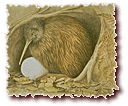| |
|
Any information about kiwi from before 1995
is likely to tell you that there are three species: the Great
Spotted Kiwi, the Little Spotted Kiwi, and the Brown Kiwi.
It'll then say that the Brown Kiwi is divided into
three varieties: North Island Brown, South Island Brown, and
Stewart Island Brown.
When the ancient kiwi first arrived in New
Zealand there was probably only one species. But New
Zealand's landscape has changed many times in the past. For
example, during the Oligocene (37 to 23
million years ago), most of New Zealand became covered by a
shallow sea. The breakup of the
landmass into this series of small islands probably caused
the extinction of many species, and
encouraged the development of many others, including those
of the moa and kiwi. Groups of kiwi would have been cut off from
other groups:
because they couldn't fly they
would have been separated by
mountains, water (wide rivers
and seas), and harsh terrain
including glaciers. These isolated
groups could breed only
amongst themselves. This is known
as 'sharing a gene pool'.
This meant
that as generations passed, kiwi in each group
became increasingly different
from kiwi in other groups. And
through natural selection, the
group traits that stuck around
were often those which were most
useful in the local
environment. In this way, groups
around the country became so
different from each other that
if they came together they
wouldn't naturally interbreed,
and hence they eventually became
separate species altogether.
|

